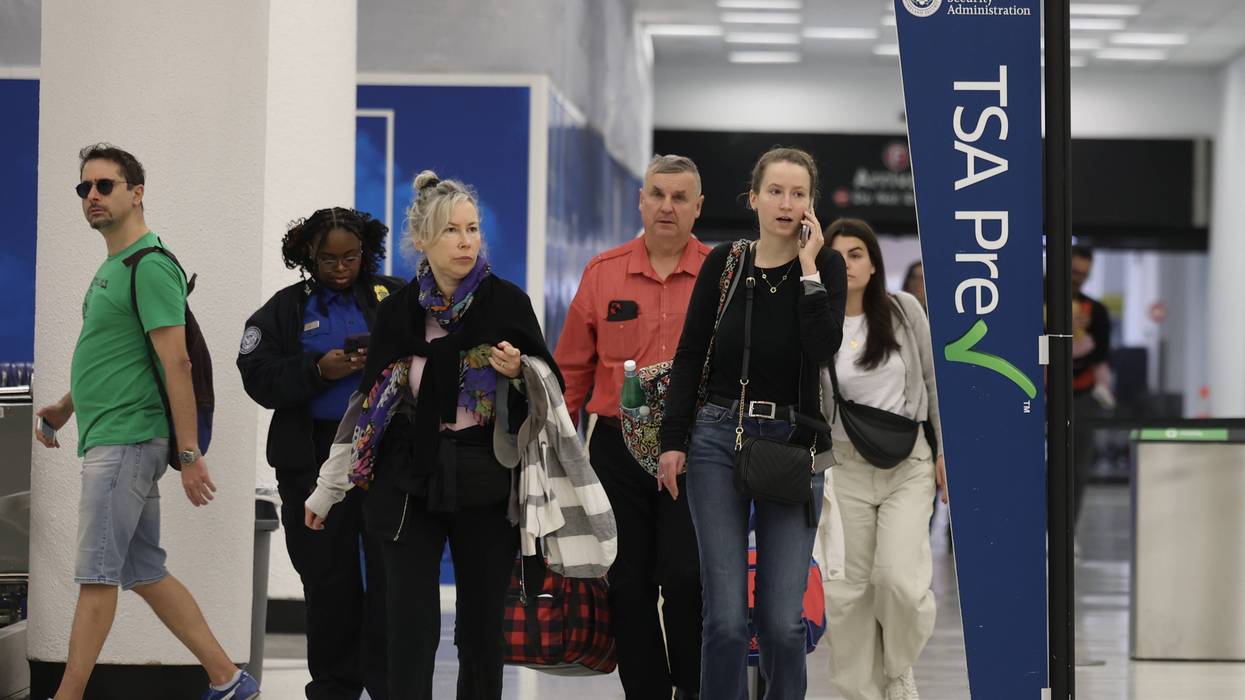Trump has called the fossil fuel-driven climate emergency a "con," but global warming is opening up potential shipping routes and access to natural resources in and around Greenland. He has claimed that if he doesn't seize the island, China or Russia will do so—though last month he announced a "framework of a future deal" for security, temporarily easing fears of a US invasion.
In his Truth Social post late Saturday, Trump shared an illustration of a Navy hospital ship, the USNS Mercy.
"As of late January, the 1,000-bed hospital ship was firmly in drydock at Alabama Shipyard in Mobile, where it has been undergoing scheduled maintenance since July 2025," according to the maritime industry news website gCaptain. "The USNS Mercy, commissioned in 1986, departed San Diego last July for a one-year scheduled maintenance period at Alabama Shipyard under an $18.7 million firm-fixed-price contract for a 153-calendar day mid-term availability, including drydocking."
Responding to the US leader on social media Sunday, Greenlandic Prime Minister Jens-Frederik Nielsen said: "It will be a no thanks from here. President Trump's idea of sending an American hospital ship here to Greenland has been noted. But we have a public health service where treatment is free for citizens. It is a conscious choice. And a fundamental part of our society."
"It is not like that in the USA, where it costs money to go to the doctor," he added. "We are always open to dialogue and cooperation. Also with the USA. But now talk to us instead of just making more or less random outbursts on social media. Dialogue and cooperation require respect for decisions about our country being made here at home."
Danish Prime Minister Mette Frederiksen somewhat indirectly pushed back against Trump with a social media post, saying that she is "happy to live in a country where there is free and equal access to health for all. Where it's not insurances and wealth that determine whether you get proper treatment. You have the same approach in Greenland. Happy Sunday to you all."
Denmark's defense minister, Troels Lund Poulsen, similarly told Danish broadcaster DR: "The Greenlandic population receives the healthcare it needs. They receive it either in Greenland, or, if they require specialized treatment, they receive it in Denmark."
"It's not as if there's a need for a special healthcare initiative in Greenland," he added.
The Nordic Council and the Nordic Council of Ministers website states that in "a number of services are provided, which are free at point of use to everyone with permanent residence in Greenland. If a doctor has prescribed treatment, and the service is not available nearby, you have the right to have the transport covered to the nearest hospital."
The site also notes that island's health service is "challenged by a shortage of staff, particularly in the most sparsely populated areas."
Aaja Chemnitz, one of the two Greenlandic politicians in the Danish Parliament, said on social media: "Another day. Another crazy news story. Donald Trump wants to send a poorly maintained hospital ship to Greenland. It seems rather desperate and does not contribute to the permanent and sustainable strengthening of the healthcare system that we need."
"Since the last election, where I campaigned for closer healthcare cooperation... we have succeeded in allocating DKK 35 million annually, and this year an additional DKK 185 million, for treatment of Greenlanders in Denmark," she continued. Those figures in US dollars are roughly $5.5 million and $29 million, respectively.
Chemnitz added:
I believe there is one thing we are missing in our understanding of health and welfare in Greenland. We should have equal access to doctors, cancer treatment pathways, and healthcare assistance like those available in Denmark. Our healthcare system is deeply challenged—more so than what is seen in Denmark.
And this is best solved together with Denmark, as one of the richest and most highly educated countries, for example in the healthcare sector. Not the United States, which has its own problems with healthcare.
This requires closer and more committed efforts from Denmark in the field of healthcare in Greenland.
More doctors from the Danish regions taking a turn in Greenland. Faster access to treatment in Denmark. And a crystal-clear prioritization of children and young people, cancer and heart diseases, and a significant improvement in psychiatry.
Is Denmark ready for that?
The United States has often ranked dead last among peer nations on metrics such as access to care and health outcomes, fueling Americans' demands for a transition from the current for-profit healthcare system to one that is publicly funded and universal.
Massive cuts to the social safety net in the so-called One Big Beautiful Bill Act signed by Trump last July and federal Republicans' failure to extend Affordable Care Act subsidies that helped tens of millions of people afford health insurance premiums—before they expired at the end of December—have further fueled calls for Medicare for All.





